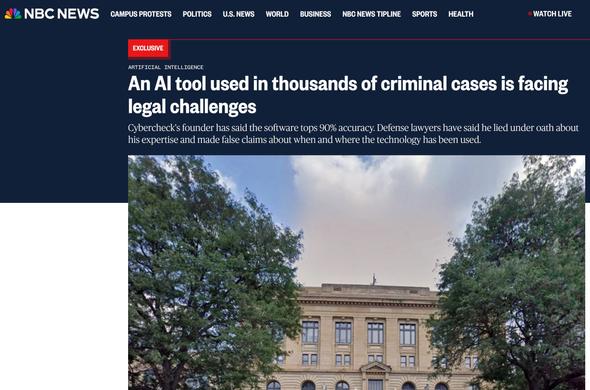Remember kids, you can't spell snake oil without #AI https://pivot-to-ai.com/2024/10/25/cybercheck-has-secured-murder-convictions-it-appears-to-just-run-websites-through-a-chatbot/
#Cybercheck
It Seemed Like an #AI Crime-Fighting Super Tool. Then Defense Attorneys Started Asking Questions
#GlobalIntelligence claims its #Cybercheck technology can help cops find key #evidence to nail a case. But a WIRED investigation reveals the smoking gun often appears far less solid.
#crime #court
https://www.wired.com/story/cybercheck-crime-reports-prosecutions/
That's why we should not believe the #boundless #promises of #technology before we've had a chance to #test them ourselves:
"An #AI tool used in thousands of criminal cases is facing legal challenges
#Cybercheck's founder has said the software tops 90% accuracy. Defense lawyers have said he lied under oath about his expertise and made false claims about when and where the technology has been used."
Law enforcement agencies and prosecutors from Colorado to New York have turned to a little-known #artificial #intelligence tool in recent years to help investigate, charge and convict suspects accused of murder and other serious crimes.
But as the software, called #Cybercheck, has spread, defense lawyers have questioned its accuracy and reliability.
Its methodology is opaque, they’ve said, and it hasn’t been independently vetted.
The company behind the software has said the technology relies on machine learning to scour vast swaths of the web and gather “open source intelligence”
— social media profiles, email addresses and other publicly available information
— to help identify potential suspects’ physical locations and other details
in homicides and human trafficking crimes, cold cases and manhunts.
The tool’s creator, Adam Mosher, has said that Cybercheck’s accuracy tops 90%
and that it performs automated research that would take humans hundreds of hours to complete.
By last year, the software had been used in nearly 8,000 cases spanning 40 states and nearly 300 agencies, according to a court decision that cited prosecutors in a New York case that relied on the tool.
In the New York case, a judge barred authorities from introducing Cybercheck evidence last year after having found that prosecutors hadn’t shown that it was reliable or well-accepted, the decision shows.
In another ruling last year, an Ohio judge blocked a Cybercheck analysis when Mosher refused to disclose the software’s methodology.
